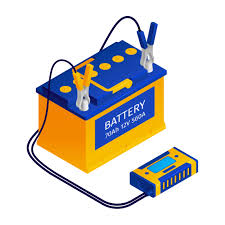
Volkswagen and its partners will invest more than 20 billion euros ($20.38 billion) in a battery cell business, generating 20,000 jobs and aiming for annual sales of more than 20 billion euros by 2030 in order to compete with Tesla, which leads the burgeoning industry.
VW's PowerCo unit will supervise battery production and research from mining through recycling, as well as initiatives such as energy storage systems, the automaker announced at the groundbreaking ceremony for its first European battery cell factory in Salzgitter, Germany's Lower Saxony region.
"The future of mobility will once again be made in Salzgitter," German Chancellor Olaf Scholz said on Thursday at the opening of the battery plant.
The factory's moniker, "SalzGiga," is a play on Tesla's recently opened "Gigafactory" near Berlin. VW has stated that its project will help the company catch up to, and eventually outperform, Tesla.
"Not so long ago, many Germans thought: we can get batteries from Asia. Today, we know better. The pandemic and Russia's brutal attack on Ukraine makes it clear dependence on global supply chains means a great risk," Scholz said.
The battery cell initiative calls for the construction of six plants in Europe, including Salzgitter, which will serve as the "blueprint" for VW's future standardised production facilities, and two in North America.
Volkswagen has stated repeatedly that producing enough batteries to power all cars is by far the most difficult problem in the transition to electric vehicles, and has announced a plan to develop plants with a combined capacity of 240 gigatonne hours (GWh) by 2030.
"The car remains the core of our business, but it will be the world's most complex digital product when it becomes electric and autonomous, making us into software developers and battery manufacturers," Chief Executive Herbert Diess said at the same news briefing to launch the plant.
Volkswagen also unveiled the standardised battery cell, which was announced in 2021 and will be used in up to 80% of the group's cars.
"What we have proven a million times over with Volkswagen vehicle platforms: standardising and scaling up allows for speed and cost optimisation with the highest quality," said PowerCo Chief Executive Frank Blome.
(Source:www.business-standard.com)
VW's PowerCo unit will supervise battery production and research from mining through recycling, as well as initiatives such as energy storage systems, the automaker announced at the groundbreaking ceremony for its first European battery cell factory in Salzgitter, Germany's Lower Saxony region.
"The future of mobility will once again be made in Salzgitter," German Chancellor Olaf Scholz said on Thursday at the opening of the battery plant.
The factory's moniker, "SalzGiga," is a play on Tesla's recently opened "Gigafactory" near Berlin. VW has stated that its project will help the company catch up to, and eventually outperform, Tesla.
"Not so long ago, many Germans thought: we can get batteries from Asia. Today, we know better. The pandemic and Russia's brutal attack on Ukraine makes it clear dependence on global supply chains means a great risk," Scholz said.
The battery cell initiative calls for the construction of six plants in Europe, including Salzgitter, which will serve as the "blueprint" for VW's future standardised production facilities, and two in North America.
Volkswagen has stated repeatedly that producing enough batteries to power all cars is by far the most difficult problem in the transition to electric vehicles, and has announced a plan to develop plants with a combined capacity of 240 gigatonne hours (GWh) by 2030.
"The car remains the core of our business, but it will be the world's most complex digital product when it becomes electric and autonomous, making us into software developers and battery manufacturers," Chief Executive Herbert Diess said at the same news briefing to launch the plant.
Volkswagen also unveiled the standardised battery cell, which was announced in 2021 and will be used in up to 80% of the group's cars.
"What we have proven a million times over with Volkswagen vehicle platforms: standardising and scaling up allows for speed and cost optimisation with the highest quality," said PowerCo Chief Executive Frank Blome.
(Source:www.business-standard.com)





